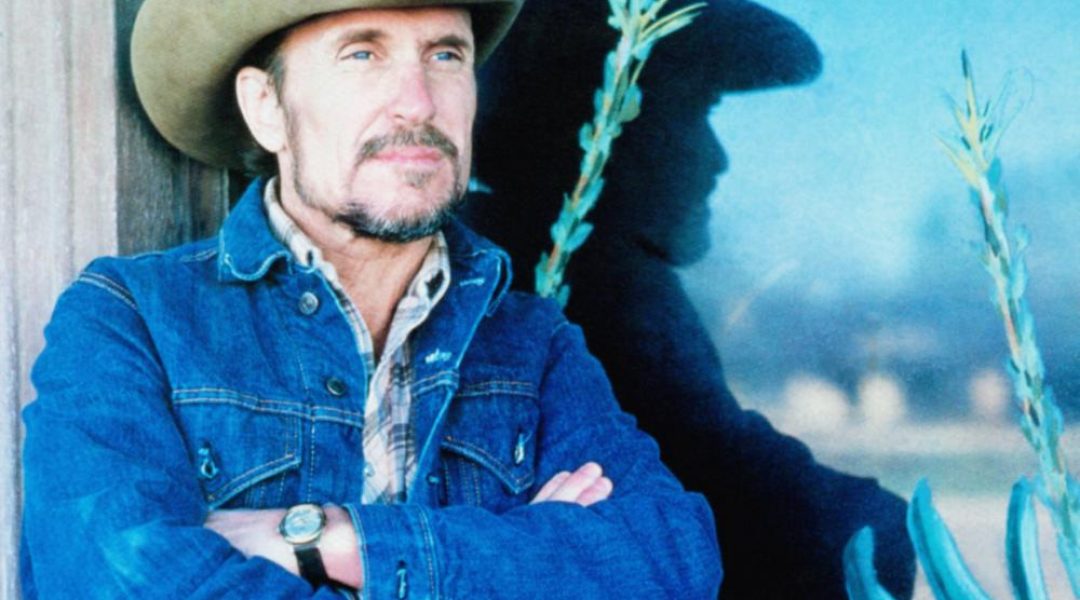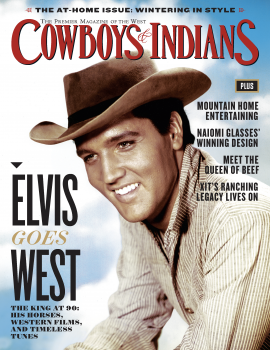We celebrate the Oscar-winning actor with a look at seven notable films.
Robert Duvall won the respect and affection of western fans with his iconic portrayal of Augustus McCrae in the epic miniseries Lonesome Dove. But he also has played his fair share of straight-shooters in big-screen westerns as well. To celebrate his birthday — he turns 90 today! — we decided to look back at a few of his films most likely to please C&I readers:
True Grit (1969)
After a few guest spots on TV series such as The Virginian and Cimarron Strip, Duvall earned his spurs in earnest as Ned Pepper, the murderous outlaw who fails to heed the “bold talk from a one-eyed fat man” (John Wayne), in this first film adaptation of Charles Portis’ best-selling novel. Even though he has fond memories of working with The Duke, Duvall remains critical of director Henry Hathaway’s insensitive instruction style: “He said to one of the actors, ‘When I say “Action,” tense up, dammit!’ I mean, you don’t tell an actor that. It’s like telling Joe Montana in the Super Bowl: ‘Tense up!’”
Lawman (1971)
Despite his prominent billing during the opening credits, Duvall has relatively little time on screen in this grim and gritty western directed by Michael Winner (Death Wish). Still, his character is one of the very few who survives a close encounter with Jared Maddox (Burt Lancaster), a brutally efficient marshal on the trail of rowdy cowboys who shot up his town and left an elderly citizen fatally wounded. Lee J. Cobb, Robert Ryan, J.D. Cannon, Joseph Wiseman, Ralph Waite and Sheree North (who would later co-star opposite John Wayne in The Shootist) appear alongside Duvall in the unusually strong supporting cast.
Joe Kidd (1972)
As Frank Harlan, a wealthy gringo landowner facing a peasant revolt led by Mexican bandito-turned-revolutionary Luis Chama (John Saxon), Duvall is nothing if not blunt-spoken: “If these people want to fight me,” he bellows, “I’ll blow them straight to hell.” Harlan hires the title character, a hard-drinking, straight-shooting former scout played by Clint Eastwood, to help him track down Chama and his followers. The longer he rides with Harlan, however, the more Joe has second thoughts about his allegiance with such an obvious scoundrel. John Sturges (The Magnificent Seven) directed this action-adventure, which was written by Elmore Leonard — and, according to Leonard, repeatedly rewritten during production in Old Tucson.
The Great Northfield, Minnesota Raid (1972)
Filmmaker Philip Kaufman (The Right Stuff) draws on the legends of Cole Younger and Jesse James in this colorfully written, richly detailed and robustly performed western. Cliff Robertson plays Younger, who attempts to be a voice of reason while advising his men to take a vacation from outlawry as the Missouri Legislature considers a bill to grant them amnesty. But hot-headed Jesse James (Duvall) is eager to plunder Northfield, Minnesota, site of the biggest bank west of the Mississippi. When the legislators, bribed by railroad barons, vote down the amnesty, Younger reluctantly agrees to the Northfield heist, and barely lives to regret it. Duvall dials it up to 11 in his wildly flamboyant performance as Jesse, and is positively side-splitting when he shamelessly dons a dress to disguise himself while slipping past pursuing lawman.
Tender Mercies (1983)
OK, we admit it: This ain’t a western, pardners. But never mind: Duvall received a richly deserved Oscar for the unvarnished brilliance of his profoundly affecting performance here as Mac Sledge, a down-and-out country singer who’s redeemed by the love a good woman (Tess Harper) in rural Texas, then pushed back to the brink by the death of his daughter (Ellen Barkin). Grown men have been known to weep while hearing Duvall’s poignant expression of Sledge’s uncomprehending sorrow: “I don’t trust happiness. I never did.” (Note: Tender Mercies also earned an Academy Award for screenwriter Horton Foote. Twenty-one years earlier, Foote got his first Oscar for his screenplay adaptation of To Kill a Mockingbird — the classic drama in which Duvall made his film acting debut as the enigmatic Boo Radley.)
Geronimo: An American Legend (1993)
Directed by Walter Hill, who would later collaborate with Duvall on the 2006 miniseries Broken Trail, and co-written by John Milius (Apocalypse Now), this well-crafted drama (reportedly a favorite of Quentin Tarantino) takes a largely admiring view of the eponymous Apache warrior (well played by Wes Studi). Indeed, even those charged with capturing Geronimo and his comrades – including grizzled scout Al Sieber (Duvall) and novice Cavalry lieutenant Britton Davis (Matt Damon) – admit to respecting him. At one point, Duvall’s Sieber memorably expresses unbridled contempt for white bounty hunters who slaughter Native Americans: “They kill any Indian, then claim they're Apache. I don't see how any man can sink that low. Must be Texans – lowest form of white man there is.”
Open Range (2003)
As grizzled cattle-drivers who ride into danger while resting their herd near a small frontier town, Kevin Costner and Duvall are a match made in western movie lovers’ heaven. Duvall is effortlessly authoritative as Boss Spearman, the peaceable senior partner in the enterprise, while Costner (who also served as director) shines as Charley Waite, a man with a history of violence. When they go up against a tyrannical rancher whose goons attacked two members of their small outfit, Waite warns his friend: “Once it starts, it’s gonna be messy like nothing you ever seen.” Not to worry, though: When the chips are down, Spearman’s aim is true. Like a boss.












